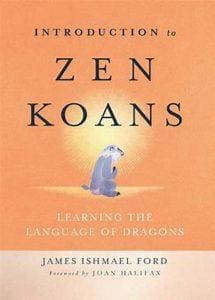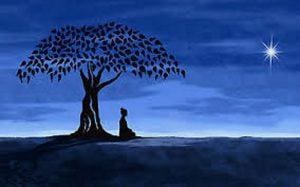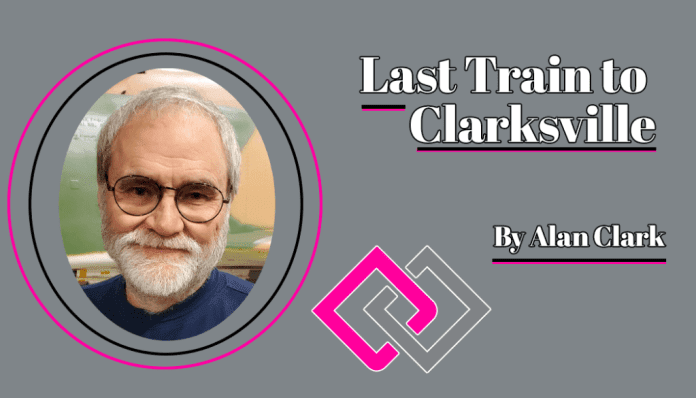Allow me a moment to introduce the Zen koan. Koans originated in the east and since there’s no English equivalent to the word, the whole notion of koans can be rather confusing for a western mind to assimilate.
 A koan shows its user two conditions for his mind – a ‘with’ and a ‘without’ condition, and it uses our natural eagerness to compare things in a most challenging and beneficial way.
A koan shows its user two conditions for his mind – a ‘with’ and a ‘without’ condition, and it uses our natural eagerness to compare things in a most challenging and beneficial way.
Whenever I work with a koan I am viewing myself either with or without my map of cherished beliefs, or the story I tell myself about how my life should look or be at the present moment.
The ‘with’ condition is what (in an unexamined way) I believe to be true. Since beliefs have consequences, they build their own fictional world. When I believe something, I usually want the world to agree with me, to reinforce my understanding, essentially. However, it rarely does so my reality narrative often comes with conflict built into its plot line.
In the ‘without’ condition, I see the world without wanting it to be different from the way it is. The without condition is in act of imagination where I ask myself what the world might look like if I loved it as is, just as it is.
Below is a koan which shows the power of imagining a different life path when I am not dependent on the stories, I normally tell myself. It also can show me what life is like in the ‘with’ condition when my internal road maps of the world very from the actual territory of the world itself.
The Koan – an example of such
“The great way is not difficult if you just don’t pick and choose.”
General consensus notes that some life events are “bad” and should make us angry or sad while other events are “good” and should make us happy or glad. But what if events don’t have to be anything other than what they are, with no judgement or value attached to them.
Losing a child or a job could both be horrible experiences, or perhaps not? Either event could open doors to an unexpectedly magnificent new life. This is what happened to me after I lost my son Eric to suicide. Instead of incessantly agonizing over the event, what might have happened if I met this horrible tragedy with some degree of openness? And was that approach even possible for me to embrace at the time?
What if the subsequent events surrounding a nefarious happening were not completely horrible? What if there was a silver lining to this thick black cold uncaring cloud? Could it be conceivably possible that my life would and could somehow become better or more fulfilling as a result of Eric’s untimely passing?
Believing that Eric’s suicide could somehow be a growth opportunity for the family, by bringing us all closer together, would not have created any conflict in my heart. The conflict which states that an event of this nature can only produce negative outcomes seemed fated to materialize, yet that’s not what happened. Eric’s suicide to quote Charles Dickens, “was the best of times, it was the worst of times.” And after the worst of times passed, an unbelievable, and unimaginable change of heart stirred my soul to new levels of enchantment.
There is a legend in which the Buddha comes upon the mind, his mind, of not picking and choosing.
 On the edge of his own profound change of heart, the Buddha meditates all night under a fig tree, and an image comes to mind. He remembers that as a child while his father plowed a field in an annual ceremony, he was left in the shade of a rose apple tree. At that moment, the boy had no guardians around to distract him. He was under no one’s gaze. His father was absorbed in plowing. The air was pleasant, the leaves light green, and the shade cool. With nothing on his mind, the child did not want or fear anything. The Sun stood still. It was delicious to be alive. He felt a happiness not born of desire. The boy moved his eyes over the whole field. He could find no resistance, no tension, no inner conflict. Everything was sufficient. There was nothing to add, nothing to subtract.
On the edge of his own profound change of heart, the Buddha meditates all night under a fig tree, and an image comes to mind. He remembers that as a child while his father plowed a field in an annual ceremony, he was left in the shade of a rose apple tree. At that moment, the boy had no guardians around to distract him. He was under no one’s gaze. His father was absorbed in plowing. The air was pleasant, the leaves light green, and the shade cool. With nothing on his mind, the child did not want or fear anything. The Sun stood still. It was delicious to be alive. He felt a happiness not born of desire. The boy moved his eyes over the whole field. He could find no resistance, no tension, no inner conflict. Everything was sufficient. There was nothing to add, nothing to subtract.
And then it occurred to him that exploring this approach, which he disavowed in childhood, might be the direction in which enlightenment laid.
In this case, not picking and choosing is something the boy wanders into. It is the natural state of the undisturbed mind. The boy notices that thoughts and feelings are always rising and falling, and that they are not inherently disturbing. Thoughts and feelings are just things in the world much like flowers and umbrellas and he doesn’t have to agree with them or quarrel with them. To survive the random thought debris field of the mind, it can be consoling to discover that we don’t have to believe our own thoughts.
Not believing everything one thinks and feels is the beginning of a new chapter. One where we can cease being a prisoner to our own thoughts, especially the ones we did/do not generate or bring into focus via concentrated thought.
If our minds present us with a choice to believe in either (A) or (B), remember, we are not limited to that particular bifurcation. We can try not picking or choosing anything. We can try to remain open to all possibilities – and we can embrace the moment with no preconceived ideas.
Conclusion
After Eric murdered himself, I was inconsolable. A big part of me died that day. And my remaining parts all wanted to die, along with him. But I still had two biological children alive, so I ‘needed’ to survive and get better.
But at no point during my convalescence period (measured in years) did I believe Eric’s suicide would make my life richer and deeper in both wonderful and joyous ways; but that’s what happened. As a result of Eric’s passing, I experienced an amazingly new and profound chapter in my life, rife with spiritual experiences and encounters.
But that’s a story for another time. Suffice it to say that Eric’s death was the single most important occurrence that ever happened to me. It completely changed me. Dare I say, I was reborn.
I thus try to embrace each moment with openness. And I try not to assume that I know what future consequences will follow certain events. Because I don’t know such. And there’s no possible or conceivable way I can so I try to remain open – open to all possibilities beyond my current understanding about how life in particular and things in general should operate.






